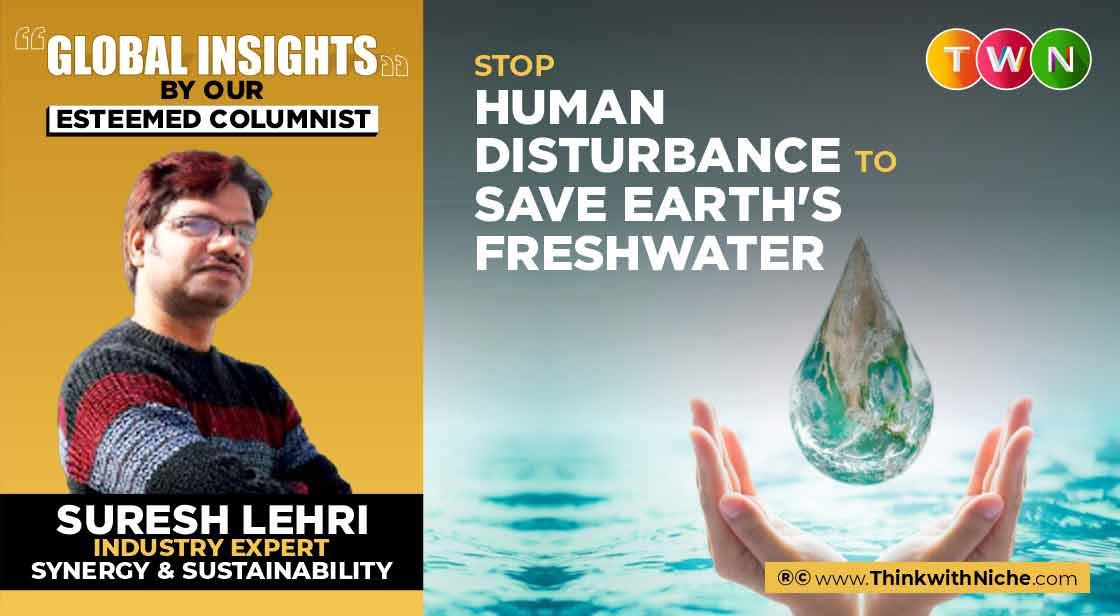Stop Human Disturbance to Save Earth's Freshwater

Blog Post
It has been suggested that Freshwater Consumption is still within safe limits worldwide. However, earlier assessments did not consider the extraction of Blue Water. This is the water that flows in rivers but resides underground. Due to sixfold increases in blue water extraction over the past century, regional borders could have been crossed in many river valleys. In addition to irrigation, crops to meet growing demand from livestock and people, global Domestic Water Consumption and increased living standards have led to an increase in population and a decrease in the quality of blue water. This has caused disruptions in aquatic ecosystems and the destruction of the life within them.
#FreshwaterConsumption
#BlueWater
#PreventSoilDegradation
#DrinkingWater
#SaveWater
The Rainwater that plants receive from the earth is called green water. It is essential for all life below and on the ground. However, some studies found that the resource is under severe pressure.
The planetary boundaries framework, a concept first discussed by scientists in 2009, identified nine processes that have been remarkably stable in the Earth system for the past 11,700 years. These include a Stable Global Climate and an intact biosphere, which have allowed civilizations that are based on agriculture thrive. Researchers suggested that each of these processes had a boundary that once crossed could cause the Earth system or significant components to be upset.
In 2015, a thorough scientific assessment found that human activity had already exceeded four of the planet's planetary boundaries. The warmer climate is being brewed by Greenhouse gas Emissions, and the sixth mass extermination of species is unpicking the global biosphere. Intensive farming is destroying the environment while natural habitats are being destroyed at a large scale. In 2022, researchers reported that the fifth planetary boundary was crossing due to the accumulation and emission of Chemical Pollution and Plastics.
It has been suggested that Freshwater Consumption is still within safe limits worldwide. However, earlier assessments did not consider the extraction of blue water. This is the water that flows in rivers but resides underground. Due to sixfold increases in blue water extraction over the past century, regional borders could have been crossed in many river valleys. In addition to irrigation, crops to meet growing demand from livestock and people, global domestic water consumption and increased living standards have led to an increase in population and a decrease in the quality of blue water. This has caused disruptions in aquatic ecosystems and the destruction of the life within them.
Green water alert: Red alert
The sun's radiation evaporates the green water from the soil. This cools the environment and returns moisture to the atmosphere, where it forms cloud and rain. This cycle supports some of the most important ecosystems on Earth. It stores approximately 112 million tonnes of carbon and has 25% of land-based living.
For example, in tropical forests and woodlands, Savannas exchange large amounts of energy and water with the atmosphere and are believed to play an important role in controlling local and regional climates.
The atmosphere is influenced by water released by plants through transpiration (evaporation, transpiration) and to oceans by rivers. This acts as a feedback mechanism as it also supports the local climate.
Research has shown that clearing forests decrease the flow of moisture to the atmosphere. This affects how well the Earth's system can circulate the water, and eventually puts ecosystems such as the Amazon at high risk of collapse. Changes in land use, particularly deforestation, and global warming are two of the main factors that have led to humanity's breaching this planetary boundary. They all have an impact on the planet's boundaries and should be treated as one connected system.
Green water is also essential for food production. 60% of global staple food production is based on rainwater, and 80% of worldwide cultivated land is rainfed. Rain is the only source of water for these areas. Rain is a key ingredient in irrigated crops.
Several types of research have shown that larger areas of the globe are more susceptible to extreme drought and wetter soils than they were before the industrial revolution. This is especially true since the 1950s. The essential role of water in maintaining resilient ecosystems is a worrying trend.
In many areas, prolonged and more severe droughts are common. These include those currently affecting Chile or the western US. This reduces photosynthesis in plants as they absorb less CO2 heating the Earth's atmosphere. As a result, the land carbon sink, which absorbs 30% of all annual CO2 emissions, has been weakened and could even become a net source.
Too much soil water is not good. Floods are more likely in soils that have been water-saturated. This can also impede plant growth. In places like India where the dry season has been extended and disrupted, excessively high amounts of water can slow down the onset of monsoons. The combination of high humidity and high temperatures can cause heatwaves that are deadly. When the body is too hot, it becomes difficult to sweat in moist air. This deadly combination is being experienced in many regions, including South Asia, the Gulf of California, Mexico, and the Middle East.
Also Read: Accomplish the Climate goals with Technological Innovations for Climate Change Mitigation
What are the options?
Scientific evidence is growing that the planet has become drier than ever in the past 11,700 years. This is threatening the ecological and climatic conditions necessary to support life.
Some analysis has shown that the sixth planetary boundary was crossed. However, ambitious efforts to slow climate changes and stop deforestation can still prevent dangerous changes in the cycle of Earth's green water. Switching to sustainable farming practices, along with other measures, would help prevent soil degradation and loss of moisture. It may be necessary to explicitly regulate green water, and protect it in legal and policy frameworks.
Research has also shown that farming is a significant cause of multiple planetary limits being broken. It is possible to shift towards plant-based diets, which is a simple but highly effective way of keeping humanity within these limits.
Humanity is not in a safe zone anymore. To maintain a resilient, nourishing freshwater cycle, immediate action is required.
You May Like
EDITOR’S CHOICE












